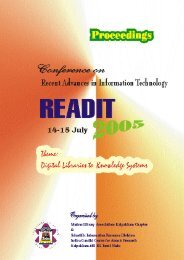READIT-2007 - Indira Gandhi Centre for Atomic Research
READIT-2007 - Indira Gandhi Centre for Atomic Research
READIT-2007 - Indira Gandhi Centre for Atomic Research
You also want an ePaper? Increase the reach of your titles
YUMPU automatically turns print PDFs into web optimized ePapers that Google loves.
qualification programmes <strong>for</strong> all categories of scientific and technical employees.<br />
Foundation of technical knowledge management was built over an operating experience<br />
of almost four decades with continuous evaluation by line managers corporate<br />
management, knowledge facilitators and. regulators, This developed a logical structure of<br />
a qualification-based organization <strong>for</strong> operating stations, which led to documentation of<br />
on-going programs with adequate guidelines on design and implementation. The aim had<br />
been to provide a broad based nuclear plant orientation and generic task skills, followed<br />
by “hands on” commissioning experience. The systems worked well as per the design<br />
intent and facilitated development of strong training infrastructure. NPCIL has six fullfledged<br />
Nuclear Training Centers (NTCs) <strong>for</strong> conduct of common organizational<br />
programs <strong>for</strong> various NPPs such as ‘<strong>for</strong>mal induction training <strong>for</strong> various categories in<br />
different disciplines’, ‘simulator training on full scope replica simulators’ and such other<br />
programs. These training centers are fully equipped with classrooms, library and various<br />
training shops catering to practical training of trainees of different disciplines. Three<br />
Nuclear Training Centers are also equipped with full-scope simulators.<br />
However, the new business environment in early nineties required, the optimized<br />
utilization of resources , compressed project schedules and quick succession of several<br />
nuclear power projects (NPPs). Hence the corporate policy in NPCIL was required to<br />
refine, restructure and accelerate all disciplines of traditional training and qualification (T<br />
& Q) systems. The thrust was to make T & Q systems more job per<strong>for</strong>mance focused<br />
requiring a much shorter lead-time to qualify personnel to different positions. Adaptation<br />
of Systematic Approach to Training (SAT) was the answer to above.<br />
Our interaction with international agencies (International <strong>Atomic</strong> Energy Agency,<br />
World Association of Nuclear Operators, CANDU Owners’ Group and such others) as<br />
well as through feedback received by internal and external peer reviews established<br />
corporate level management commitment to adaptation of such SAT methods. A uni<strong>for</strong>m<br />
and systematic approach <strong>for</strong> managing these changes at NPP sites in all the disciplines<br />
without interrupting the ongoing training activities was implemented in selective and<br />
phased manner <strong>for</strong> effective change management. This also paved the way <strong>for</strong> structured<br />
capture of tacit/explicit knowledge in <strong>for</strong>m of ‘on-job-training checklist questionnaires’,<br />
simulator lesson plans, examination syllabus and such others.<br />
From year 2000 onwards, expansion of organization and retention of knowledge<br />
resources became the key issues . Superannuation of experienced personnel and attrition<br />
of young engineers needed a makeover in erstwhile corporate policy of knowledge<br />
management and training, <strong>for</strong> preserving existing knowledge <strong>for</strong> competitive business<br />
advantage The basic need of uni<strong>for</strong>m and systematic knowledge management approach in<br />
NPCIL was to inculcate confidence towards preparedness of NPCIL to undertake massive<br />
expansion program by ensuring adequate knowledge resources and competent trained<br />
staffing.<br />
95

















